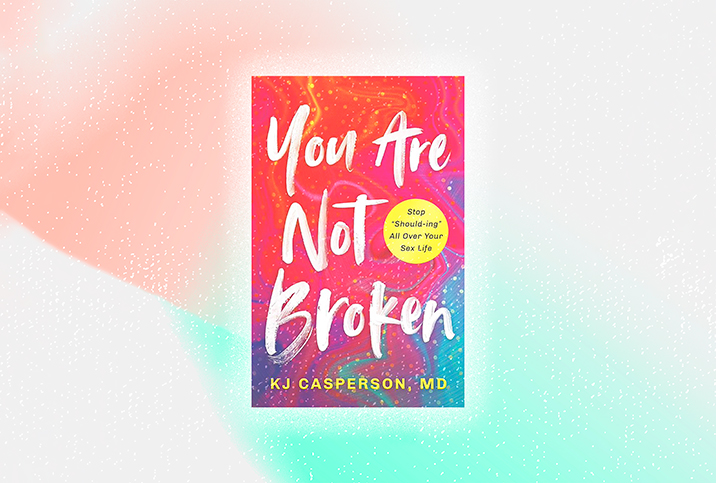Between the Pages: 'You Are Not Broken'

A urologist with advanced training in pelvic medicine and surgery, Kelly Casperson, M.D., breaks down myths about women's sex drive seen through the lenses of Hollywood and society on her podcast, "You Are Not Broken," and Instagram account, @kellycaspersonmd.
In her new book with a shared name, "You Are Not Broken: Stop Should-ing All Over Your Sex Life," Casperson discusses how women can adjust their mindset and tailor their sexual experience to their physical needs. The book is full of real-life stories and tips for starting a conversation about sex with your partner.
In this exclusive interview with Giddy, Casperson talks about low sexual desire, the overemphasis on penis-in-vagina intercourse and how to discover what you really want in the bedroom.
Editor's note: This interview has been edited for length and clarity.
What do you mean by 'you are not broken' and 'stop should-ing all over your sex life'?
Casperson: I'm a urologist. I had a life-changing patient who was crying in my office because of low sexual desire. I had no idea how to help her. I was basically taught women are complicated and difficult. Because of her, I dove deep into the science and the data and was like, "Wow, we actually know a lot more than people think we know about this. We're just not taught it."
As women kept coming in, they'd tell me whatever is bothering them and I'd tell them, "You are not broken. That's actually very common and normal." I just kept repeating, "You are not broken," over and over again. Once I realized I needed to go bigger than just seeing people in my clinic, I started a podcast two and a half years ago. The podcast is called, "You Are Not Broken." It's just a natural way of everybody thinking they're broken because we never got decent sex ed.
When we were in eighth grade, we got some kind of sex ed. It's usually fear- and shame-based; a pregnancy prevention program is kind of what we got. Nobody really gave us an adult sex ed. Now we're actually having sex. We're in a relationship and we don't know how to talk about it. The only way we think about it is how society has piled on all these "shoulds." We just feel very, very broken. And, really, it's a lack of education on how our bodies and our brain work.
The shoulds come from so many people: "I should have this sort of desire," "I should have sex this many times a week," "I should have a perfect body before I can enjoy it"; all these layers of shoulds that they use to limit their sex life. Stop should-ing. But you have to realize what your shoulds are.
How is our brain important to sexual desire?
It's so important to talk about this because I think many people view desire as an innate thing that's just a drive, which it's not. The other thing is that people view desire as some external product to be purchased or an external circumstance where if it's perfect then the desire shows up. When we do that, we're giving away all of our power to create desire. Desire is a thought, a feeling and an action.
How many times do we actually consciously work on creating desire for what we have in our life, our own body or our partner? We think we can just "should" all over our bodies and our partners, and have spontaneous sexual desire for either of those things. It's not how it works. First, we have to have the awareness that we're not desiring the things we have. I have an activity in the book where I encourage you to write down a couple of things you desire, and then how many of those things do you actually already have? We often don't desire the things we already have.
You write that when you ask women what they actually want, you're often met with blank stares. Why do you think that is? And what can women, and everyone, do to better understand what they want in the bedroom?
I think what a lot of women think they want is what the movies tell them is a good sex life. Who else is telling them what a good sex life is? Where are we supposed to learn what a good sex life is? We're just taking all this information and trying to want what they say is really awesome, which is just putting a penis in the vagina and having an orgasm. That's what's modeled for us in Hollywood and all the spontaneous desire rock 'n' roll and country music songs out there.
I think they want what they see, not knowing that what they see is completely fake and created, usually by men. You're not going to have time in a Hollywood movie to say, "Let's find the clitoris and make sure we both have orgasms. Let's make sure you're not stressed or sick or have a bad body image." It's all these things we have to deal with when real life hits us. Hollywood and porn sex scenes are completely fake, but we take that as a model of what our sex life should be. Stop should-ing yourself.
Because women have never been taught how to figure out what they want, they don't know how to figure it out. It's almost like a paralyzing question: 'I don't even have the tools to know how to figure out that question.' I usually start by saying, "What don't you want?" They'll say, "I don't want to just have this because he wants it. I don't want to just be a vehicle so he has an orgasm. I don't want sex when I'm totally exhausted and I'm doing it so he doesn't get cranky." Everyone would admit that's bad sex. A lot of people are having that type of sex. It's almost undoing what you don't want to figure out what you do want.
You stress that sex should be more than penis-in-vagina (PIV) for heterosexual couples. PIV is seen as the default, but the majority of women can't orgasm from it. Why is it important that hetero couples take the focus off PIV?
A lot of men will say, "I'd really like my partner to like this more because it's nice to have a partner who likes sex." You might actually get more sex if she thinks it's sex worth having. He might want a partner who's all in and enjoys it as much as she does. I think when a guy is interested, he's showing he cares about his partner.
The thing is, men didn't get taught, either, and they don't even have the body parts. They've been told by Hollywood and everyone else that you put the penis in the vagina and you go hard and go fast, and that's what's supposed to happen. But that actually might hurt her. And even if it doesn't hurt her, she may not want to do it again.
It's really learning and communication. The "sex talk" was like that one talk with your parents, and then we think it's that one talk with your spouse or significant other. No, it's actually part of a conversation as people go through life. There will be stresses and illnesses and vaginal births, and there will be erectile dysfunction. There are going to be bumps in your sex life. And the sooner we can learn to normalize troubleshooting and needs and wants and expectations, the better it's going to set you up as the years go on.

















